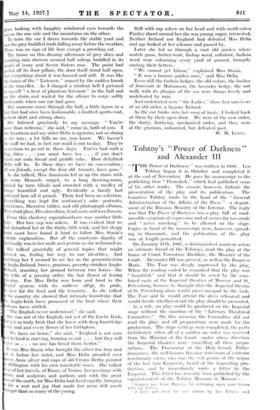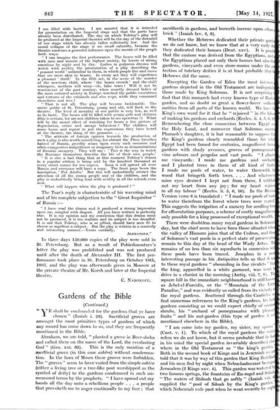Tolstoy's "Power of Darkness" and Alexander III " T HE Power
of Darkness " was written in 1886. Leo Tolstoy began it in October and completed it at the end of November. He gave his manuscript to the publishing firm " Posrednik," which had published some of his other works. Time censor, however, forbade the presentation of the play and its publication. The Countess Tolstoy wrote to the head of the " General Administration of the Affairs of the Press "--a depart- ment of the Russian Ministry of the Interior. The reply was that The Power of Darkness was a play full of inad- missible cynicism of expression and of scenes far too crude and " nerve wrecking " to be allowed on the stage. Copies in hand of the manuscript were, however, spread. ing in thousands, and the publication of the play was at length permitted.
On January 27th, 1887, a distinguished amateur actor, an intimate friend of the Tolstoys, read the play at the house of Count Vorontzov Dashkov, the Minister of the Court. Alexander III was present, as well as the Empress Marie. The Tsar was deeply impressed by the play. When the reading ended he remarked that time play was " beautiful," and that it should be acted by the com- bined casts of the Imperial theatres of Moscow and St. Petersburg, because he thought that the Imperial theatre of St. Petersburg alone would prove unequal to the task. The Tsar said he would attend the dress rehearsal and would decide whether or not the play should be presented.
As a rule, no play could be produced on the Imperial stage without the sanction of the " Literary Theatrical Committee." On this occasion the Committee did not read the play, and all preparations were made for time production. The stage settings were completed, the parts distributed, when all of a sudden an order was received from the Minister of the Court—under whose direction the Imperial theatres were—cancelling all these prepa- rations. The Procurator of the Holy Synod, Pobie- donostzev, the well-known Russian statesman of extreme reactionary views who was the evil genius of the reigns of the last. two Emperors, heard of the impending pro- duction, and he immediately wrote a letter to the Emperor. This letter has recently been published by the superintendent of the Tolstoy Museum in Moscow :-- - Forgive ma, Your Majesty, for infringing upon your leisure
with my letters. I have just read th" new drama by Leo Tolstoy and
theatre exercises a powerful influence upon the morals of the people of our stage which has already fallen sufficiently low. And the moral collapse of the stage is no small calamity, because the for presentation on the Imperial stage and that the parts have already been distributed. The day on which Tolstoy's play will be produced at the Imperial theatres will be the day of the downfall I am filled with horror. I am assured that it is intended both ways. I can imagine the first performance. The boxes will be filled with men and women of the highest society, by lovers of strong emotions by night and by day. Ladies in gorgeous dresses will watch with avidity the presentation of a play describing the peasant world ' unfamiliar to them, in which people live and move that are more akin to beasts. In every act they will experience a pleasant thrill.' In the fifth act, in the scene of the murder of the newborn child, where the bones crunch' and the child whimpers, mothers will weep—oh, false tears ! Will it not be reminiscent of the past century, when smartly dressed ladies of the most cultured society in Europe watched the public executions and tortures of the criminals and also wept, while they consumed chocolates and ices ?
" That is not all. The play will become fashionable. Tho entire public of St. Petersburg, young and old, will flock to the theatre. The level of morality of our public is very low, as well as its taste. The boxes will be filled with young girls and children (this is certain, for are not children taken to see operettas ?) What will be the moral effect of watching for hours a live picture of degradation, crime and savage behaviour ? The children will come home and repeat in jest the expressions they have heard at the theatre, the slang of the peasants. . . . The attitude of foreign opinion towards the production of such a play is also worth considering, for abroad the Press breathes hatred of Russia, greedily seizes upon every such occasion and often exaggerates insignificant or imaginary facts as demonstrations of Russian savagery. They will say : This is the way in which the Russians themselves describe the life of their own people.'
" It is also a bad thing that at this moment Tolstoy's drama in a popular edition is being sold by the hundred thousand at every street corner for ten copecs. Soon it will spread all over Russia and everyone will have a copy. The front page bears the inscription, ' For Adults.' But this will undoubtedly attract the attention of all the young people and of the children, and the play is undoubtedly being read with avidity in all the schools even now.
" What will happen when the play is produced ? "
The Tsar's reply is characteristic of his wavering mind and of his complete subjection to the " Great Inquisitor " of Russia :- " I have read the drama and it produced a strong impression upon me, mingled with disgust. All you have written is perfectly true. It is my opinion and my conviction that this drama must not be produced, it is too realistic and its subject is too dreadful. It is sad that Tolstoy, who is so gifted, should have seen fit to choose so repellent a subject. But the play is written in a masterly and interesting manner.—Yours cordially, ALEXANDER."
In three days 150,000 copies of the play were sold in St. Petersburg. But as a result of Pobiedonostzev's letter the play was prohibited and was not produced until after the death of Alexander III. The first per- formance took place in St. Petersburg on October 18th, 1895, and the play was afterwards given in Moscow at the private theatre of Mr. Korsh and later at the Imperial theatre.
C. NABOKOFF.



























































 Previous page
Previous page